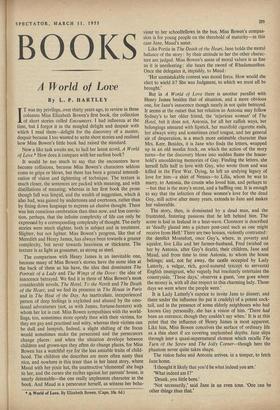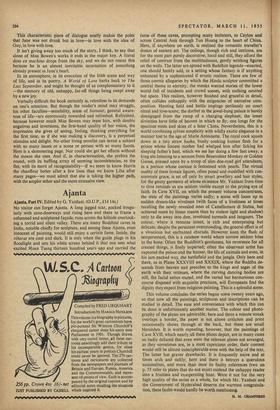BOOKS
A orld of Love
By L. P. HARTLEY IT was my privilege, over thirty years ago, to review in these columns Miss Elizabeth Bowen's first book, the collection of short stories called Encounters. I had influenza at the time, but I forgot it in the mingled delight and despair with which I read them—delight for the discovery of a master, despair because I too wanted to write short stories and realised how Miss Bowen's little book had raised the standard.
Now a like task awaits me, to hail her latest novel, A World of Love.* How does it compare with her earliest book?
It would be too much to say that the encounters have become collisions, because Miss Bowen's characters seldom come to grips or blows, but there has been a general intensifi- cation of vision and tightening of technique. The texture is much closer, the sentences are packed with meaning, and with distillations of meaning; whereas in her first book the prose though full was limpid, and the wealth of suggestion, which it also had, was gained by undertones and overtones, rather than by fining down language to express an elusive thought. There was less conscious cerebration then than now, and less convic- tion, perhaps, that the infinite complexity of life can only be expressed by a corresponding complexity of thought. The early stories were much slighter, both in subject and in treatment. Slighter, but not lighter. Miss Bowen's progress, like that of Meredith and Henry James, has always been towards a greater complexity, but never towards heaviness or thickness. The texture is as light as gossamer, as strong as steel.
The comparison with Henry James is an inevitable one, because many of Miss Bowen's stories have the same idea at the back of them as his have, the idea that dominates The Portrait of a Lady and The Wings of the Dove: the idea of innocence betrayed. We find it in three of Miss Bowen's most considerable novels, The Hotel, To the North and The Death of the Heart; and we feel its presence in The House in Paris and in The Heat of the Day. An inarticulate, inexperienced person of deep feelings is exploited and abused by the emo- tional adventurers (not, as with James, fortune-hunters) with whom her lot is cast. Miss Bowen sympathises with the world- lings, too, sometimes more openly than with their victims, for they are gay and practised and witty, whereas their victims can be dull and lumpish. Indeed, a slight shifting of the focus would sometimes make the persecuted and the persecutors change places : and when the situation develops between children and grown-ups they often do change places, for Miss Bowen has a watchful eye for the less amiable traits of child- hood. The children she describes are more often nasty than nice, and nowhere is this truer than in her latest story, where Maud with her pixie hat, the unattractive 'elemental' she hugs to her, and the curses she recites against her parents' house, is nearly detestable—the one really unpleasant character in the book. And Maud is a persecutor herself, as witness her beha- • A World of Love. By Elizabeth Bowen. (Cape, 10s. 6d.) viour to her schoolfellows in the bus. Miss Bowen's compas- sion is for young people on the threshold of maturity—in this case Jane, Maud's sister.
Like Portia in The Death of the Heart, Jane holds the moral balance of the story : by their attitude to her the other charac- ters are judged. Miss Bowen's sense of moral values is as fine as it is unrelenting: she bears the sword of Rhadamanthus. Once she delegates it, impishly, to Maud : 'Her unmistakable content was moral force. How would she elect to wield it? She was Judgment, to which we must all be brought.'
But in A World of Love there is another parallel with Henry James besides that of situation, and a more obvious one, for Jane's innocence though nearly is not quite betrayed. It seems at the outset that her relation to Antonia may follow Sydney's to her older friend, the 'injurious woman' of The Hotel, but it does not. Antonia, for all her raffish ways, her belongings smeared with lipstick, her manifold cigarette ends, her always witty and sometimes cruel tongue, and her general air of desperation, is a much more estimable character than Mrs. Kerr. Besides, it is Jane who finds the letters, wrapped up in an old muslin frock, on which the action of the story turns—for the discovery blows into sudden flame the house- hold's smouldering memories of Guy. Finding the letters, she herself falls half in love with Guy, who wrote them and was killed in the First War. Dying, he left an undying legacy of love for him—a shirt of Nessus—to Lilia, whom he was to marry, to Antonia, the cousin who loved him, and perhaps to —but that is the story's secret, and a baffling one. It is enough to say that the infection of these women's love for the dead Guy, still active after many years, extends to Jane and makes her vulnerable.
The story, then, is dominated by a dead man, and the frustrated, festering passions that he left behind him. The scene is laid in Ireland in a heat-wave. Clonmore is described as 'deadly glazed into a picture post-card such as one might receive from Hell.' There are two houses, violently contrasted : the derelict Montefort, once Guy's, where, in poverty and squalor, live Lilia and her farmer-husband, Fred (wished on her by Antonia, after Guy's death), their children, Jane and Maud, and from time to time Antonia, to whom the house belongs; and, not far away, the castle occupied by Lady Latterly, a vulgar, rich, good-natured (except to servants) English immigrant, who vaguely but resolutely entertains the countryside. 'These days,' observes a guest, 'one goes where the money is, with all due respect to this charming lady. Those days we went where the people were.'
It is Lady Latterly's caprice to invite Jane to dinner; and there under the influence (to put it crudely) of a potent cock- tail, and in the presence of some elderly neighbours who had known Guy personally, she has a vision of him. 'There had been an entrance, though they couldn't say when.' It is at this point that the influence of Henry James is most apparent. Like him, Miss Bowen conceives the surface of ordinary life as a thin sheet if ice covering unplumbed depths. Jane slips through into a quasi-supernatural element which recalls The Turn of the Screw and The Jolly Corner—though here the phantom never quite takes shape.
The vision fades and Antonia arrives, in a temper, to fetch Jane home.
'I thought it likely that you'd be what indeed you are.' 'What indeed am I?'
'Drunk, you little bore.'
'Not necessarily,' said Jane in an even tone. 'One can be other things than that.'
This characteristic piece of 'dialogue neatly makes the point that Jane was not drunk but in love—in love with the idea of Guy, in love with love.
It isn't giving away too much of the story, I think, to say that alone of Miss Bowen's works it ends in the major key. A literal deus ex machina drops from the sky, and we do not resent this because he is an almost inevitable incarnation of something already present in Jane's heart.
In its atmosphere, in its evocation of the Irish scene and way of life, and in its poetry, A World of Love harks back to The Last September, and might be thought of as complementary to it —the memory of old, unhappy, far-off things being swept away
by a new joy. • Verbally difficult the book certainly is, relentless in its demands on one's attention. But though the reader's mind may struggle, his other faculties—sensibility, sense of humour, general aware- ness of life—are enormously rewarded and refreshed. Refreshed, because however much Miss Bowen may tease him, with double negatives and inversions, the first-hand quality of her vision, the impression she gives of seeing, feeling, thinking everything for the first time, as if she was making a discovery, is a perpetual stimulus and delight. No other living novelist can invest a subject with so many issues or a scene or person with so many facets. Hers is a shimmering page. Nor could she get her effects without the means she uses. And if, in characterisation, she prefers the round, with its baffling array of seeming inconsistencies, to the flat, with its merit of recognisability—if we seem to know Harris the chauffeur better after a few lines than we know Lilia after many pages—we must admit that she is taking the higher path, with the ampler tether and the more extensive view.











































 Previous page
Previous page